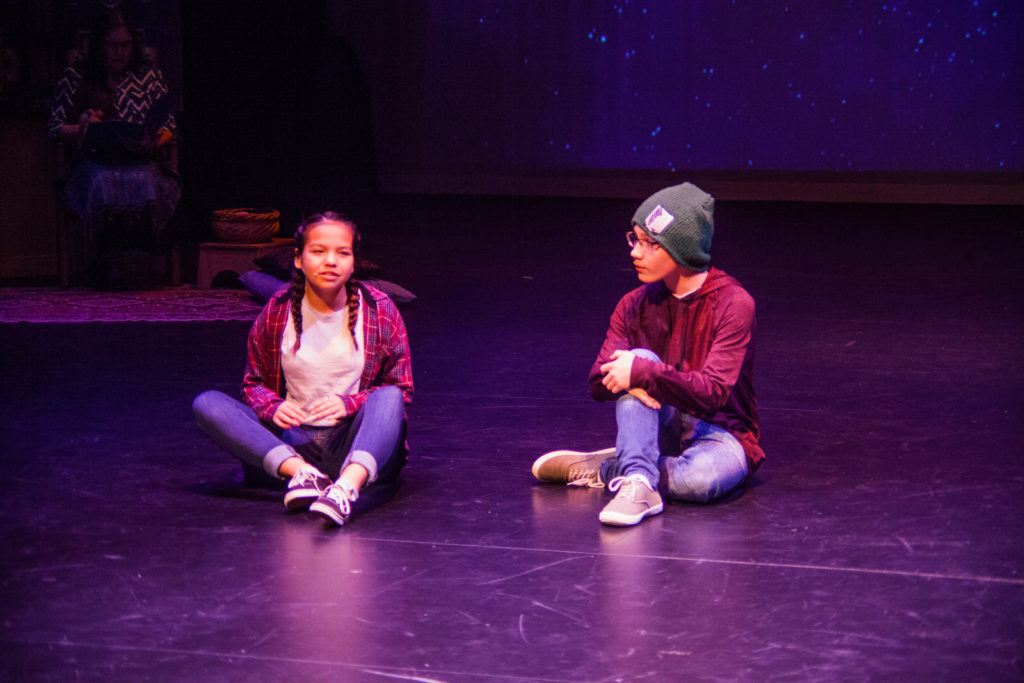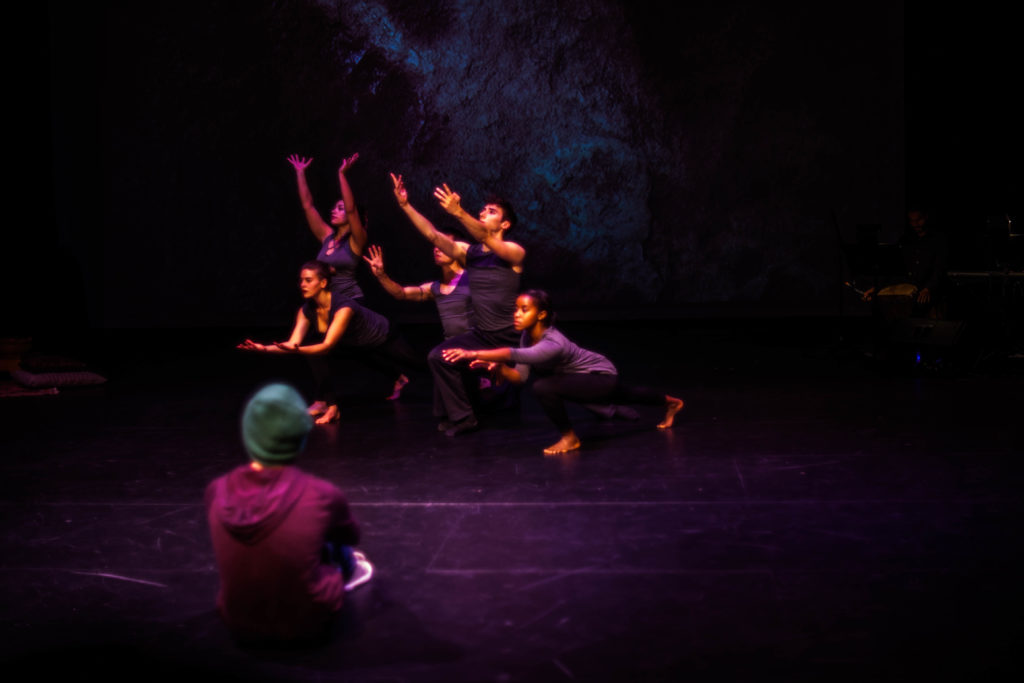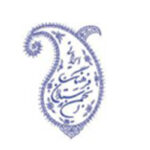Opening doors through the arts
 The play features two youth, played by Kate-la Hanuse and Gabriel Paul, who explore questions about the meaning of existence and their purpose in it.
The play features two youth, played by Kate-la Hanuse and Gabriel Paul, who explore questions about the meaning of existence and their purpose in it.
The community of Victoria, B.C. had a resoundingly positive response to a play that presented concepts from the teachings of Bahá’u’lláh, reminiscent of the Shoghi Effendi’s statement that “Art can better awaken such noble sentiments than cold rationalizing, especially among the mass of the people.”1
Victoria, the beautiful capital city of British Columbia, is home to 86,000 people of diverse backgrounds. Many new immigrants, refugees and foreign students commingle with young families, business professionals and retirees as well as the original inhabitants: the Coast Salish First Nations.
For the 200th anniversary of the Birth of Bahá’u’lláh, the Victoria Bahá’í community hosted a variety of small family and neighbourhood-based celebrations. They also rallied around a more formal artistic evening – a play commissioned by the Local Spiritual Assembly. This prompted them to further reach out “to all those with whom they share a connection.”2
The play, titled The Gathering, was directed by Victoria resident Laura Lee and performed at Glenlyon Norfolk School Theatre in Victoria on the 20th and 21st of October. Approximately 650 people attended over the two nights, including a diverse mix of children, youth and adults from across the city. A third performance, held in Sidney, B.C., was attended by over 150 Bahá’ís and their guests.
Drawing inspiration from a traditional Hopi legend and the Writings of Bahá’u’lláh, the play, Ms. Lee explains, is meant to affirm “our origins as one human family and offer a glimpse of our noble destiny.” The plot follows an Indigenous youth searching for the meaning of existence and his purpose in it. His questions are answered through the tales of his grandmother, which come to life through visuals, music and dance. The concept that humanity is undergoing a period of turbulent adolescence parallels the journey of the youth in the drama. The play also explores other Bahá’í themes, including progressive revelation and the independent investigation of truth.

The youth’s questions are answered through the tales of his grandmother, which come to life through visuals, music and dance.
The production featured two First Nations actors, 14-year-old Gabriel Paul and 15-year-old Kate-la Hanuse, as well as Deloria Bighorn, who played the part of the grandmother. Of the 18 main actors, singers, dancers and musicians who participated in the production, only two were Bahá’ís. A Bahá’í community choir was also formed to contribute to the music.
Intensive effort was directed toward inviting those from the wider community. Community member One community member, for instance, invited friends attending her Ruhi study circle, devotional, those she home visits, her medical care team, personal friends and new acquaintances that showed an interest in the Faith. She also challenged herself to invite dignitaries within the community.
“Each invitation led to a moving and uplifting conversation about the teachings and the life of Bahá’u’lláh,” she explained. Of those who came, she said they “separately and on different occasions said they understood the teachings in a new light because of this event. This way of showing the universality of Bahá’u’lláh’s message and covering many deep questions was beautiful and moving.”
To help deepen her contacts further, she also purchased 14 copies of the newly-published magazine The Bahá’ís and brought them to each of her friends who had either attended the play or expressed an interest in attending. They all received it with eagerness. “This ingenious little play,” she later commented, “opened so many doors and so many hearts.”
Victoria resident Mona Shariarty shared that, of the 70 people her family invited, 55 attended. All felt honoured by the invitation. Young people seemed to be particularly engaged. “Right after the play one family continued to ask questions about progressive revelation,” she shared. “Their 13-year-old daughter had also attended and they felt that the questions asked during the play are essential for youth her age.”
The power of the arts in aiding understanding was clearly apparent. One guest said that she was shocked when the grandmother in the play said that Bahá’u’lláh was the fulfillment of every promise and prophecy of past traditions. The individual who invited her reflected, “In all our gatherings, we’d never mentioned that little fact. So many details recounted, and we’d missed the spiritual heart of the Revelation! Thank goodness for the arts. They do what they do so well: in context, joyfully and gently.”
Community members continued to follow up with those who had attended the play, in many cases conversing over coffee or dinner. These and other events contributed to the goal of 95 home visits, firesides or devotional gatherings set by the Local Spiritual Assembly to be achieved from the close of the bicentenary up to the Day of the Covenant. Some were extended invitations to a local theatre where over 100 people viewed the film Light to the World.
Following the performances, a meal was organized to express gratitude to the youth and adult artists who gave their time to the project and to reflect with them on the experience. There were many insightful comments about the short but intense journey of preparing for the performances. Notable was the sense of community that everyone felt throughout the process. The mother of one of the Indigenous youth actors spoke from the heart of her gratitude for the warm welcome the Bahá’í community extended to her and her son during the month of rehearsals.
One audience member seemed to sum up the thoughts of many in commenting, “It was the highlight of 2017 for me.”
– Anisa Skuce-Newell
1 From a letter written on behalf of Shoghi Effendi to an individual believer, 10 October 1932
2 Department of the Secretariat, The Universal House of Justice to all National Spiritual Assemblies, 18 May 2016.
Changes and corrections from the print version: A community member’s name has been removed at the individual’s request, along with a quote that was incorrectly attributed. The text has been altered accordingly for clarity.
Category: Community life








